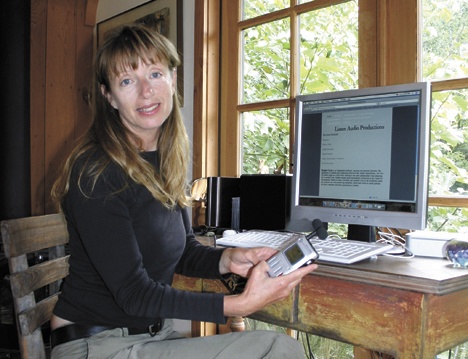Islanders can tell their stories and bestow their values upon friends, family members or future generations, thanks to an Islander who interviews and records the memoirs of others on digital audio.
Heather Carrie, 47, launched Listen Audio Productions this summer, and hopes to interview people from all walks of life and capture their stories on CDs to be shared with whomever the interview subject pleases.
For a flat fee, she’ll sit down with someone, young or old, and record memoirs, songs and autobiographical information, as well as ethical wills — where people pass down not money but the values and stories they’d like to leave behind.
“I have been fascinated with stories since a young age,” Carrie said. “I have a really strong sense of connection to story — I love it.”
She records using a small digital field recorder and microphone, which makes it easy for her to conduct interviews wherever an interview subject is most comfortable.
“That’s the idea: I can go where needed,” she said. “I’m very portable.”
Carrie attended Duke University’s Center for Documentary Studies to become the independent producer and personal historian she is today.
She believes everyone has a story worth telling and enjoys drawing that story out, she said.
“I always want to show respect to everyone, whatever their story is, and acknowledge that everyone has an amazing story and life,” Carrie said. “When you do a story on someone, how you work with them and how you present it is important.”
She’s drawn, she said, to audio recording instead of video recording because it’s a less intrusive way of interviewing.
“I believe people are more empathetic and they listen more when they’re not looking at what somebody’s wearing, what they look like,” she said. “It’s just an easy way of preserving stories in a beautiful way.”
Besides recording people’s life stories, Carrie is interested in recording their ethical wills.
“It’s a very ancient tradition where elders, before they died, would gather the family around and tell their stories of the values they want to pass on,” Carrie said.
“Ethical wills have nothing to do with material assets,” she added. “An ethical will is a personal legacy that transmits values, stories, the lessons life has taught you — the information that is too valuable to risk being lost.”
Besides recording the values and stories of others, Carrie recently sat down with three generations of women in one family to capture a part of their personal heritage — song.
Islander Cathy Desmet grew up with her mother and grandmother singing favorite nighttime lullabies to her.
Desmet now has an infant daughter of her own and wanted to be able to pass the cherished lullabies to her child but was having trouble remembering them. So she commissioned Carrie to record her mother and grandmother singing the songs together.
“They’re songs that my grandmother sang to my mom and my mom sang to each of us kids,” Desmet said. “My daughter will be able to hear them, and potentially her children, too. It’s a way to pass down that family history.”
Desmet’s mother Ann said she had a pleasant experience singing the songs with her mother to be recorded on CD.
“I was very glad Cathy had the idea,” she said, adding that the experience strengthened her already close relationship with her 91-year-old mother.
“I hope our children and grandchildren will appreciate it and be able to pass it on to their children,” Ann said. “That was the main reason we did it.”
Ann said Carrie was very supportive and non-judgmental during the recording process.
That’s something Carrie always tries to do — let her interview subjects share freely, without feeling self-conscious that their words are being recorded.
“The thing I try to do most of all is be respectful — and just listen,” Carrie said.


